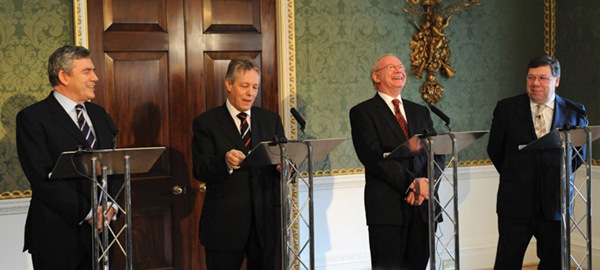In their own words
On Friday 5 February, the four main men stood in front of the cameras at Hillsborough, speaking on the deal which had been reached over 120 hours of negotiations and countless meals in The Plough.
The two visiting PMs’ expressions could not have been more removed from Thursday of the previous week when they took their leave. Both men’s tone mixed contentment with relief. Gordon Brown said the agreement would pave the way for “a new form of co-operation and mutual respect” between the two communities.
The deal, he said, belonged to all of Northern Ireland, adding: “It affects, more than ever before, their future.”
Brian Cowen said the 21-page document was an “encouraging report”, adding that he believed that “fair and balanced compromises” were needed for the future. He welcomed the work done on parading and praised the “wisdom and leadership” of all the main parties. The agreement, he said, would be the life-blood of the institutions for the years to come.
Returning First Minister Peter Robinson called it a “good day for Northern Ireland” because the perceived progress made in the weeks leading up to the agreement had been secured.
Tangible evidence that the province will not be going back to the past is shown in the agreement, making for a “stable and peaceful Northern Ireland and a better future for us all”.
Even after the exacerbation the public had shown throughout the talks, and indeed since, Robinson said that Northern Ireland can “often forget how far we’ve come in recent years,” and added that “we can’t become complacent.”
“For too long we have been distracted by the issue of policing and justice. The deal did not come quickly or easily but will be all the more secure for the time invested in it,” he said. “Politics is not a spectator sport, but politics is working.”
Pre-empting his detractors he added: “There are some who will play politics with this agreement and that is understandable but we have not been rushing.”
“This might just be the day that the political process in the North came of age,” Martin McGuinness offered. He also revealed that with so much attention on the talks inside the castle, “the last thing we want to do when the eyes of the world are on us is fail.”
He also echoed Robinson’s sentiments, adding: “It is hardly surprising for people that it has been difficult. The reality is that I am an Irish republican, I believe in a united Ireland and [unionists] want to retain the union with England. This should not mean we are incapable of respecting one another, of treating each other equally.”
His party, he added, is “utterly determined” to working with unionists in good faith and good heart. “I want to work with Peter for the good of our entire community. That is what Sinn Féin is about.”
Then SDLP leader Mark Durkan said simply that his party welcomed the devolution of justice powers, though “we wish it could have been sooner”.
He did say, however, that the party would proof-read the document, “not to pose problems, but to pre-empt them”.
Durkan also restated his opposition to the “exclusion of nationalists from government and the departure of the Good Friday Agreement”.
Reg Empey, whose party largely did not take part in the talks, criticised the way in which parties outside of the big two were not kept in the loop.
“I received this document at 11 o’clock this morning. I had no previous sight of its contents and as I have repeatedly stated, the Ulster Unionist Party has not been involved in any of the negotiations which led to this agreement,” he said, adding “the DUP and Sinn Féin have taken 120 hours to negotiate this document so we will take as long as it takes to come to our conclusions.”
The deal itself is analysed in depth on pages 18-20.






